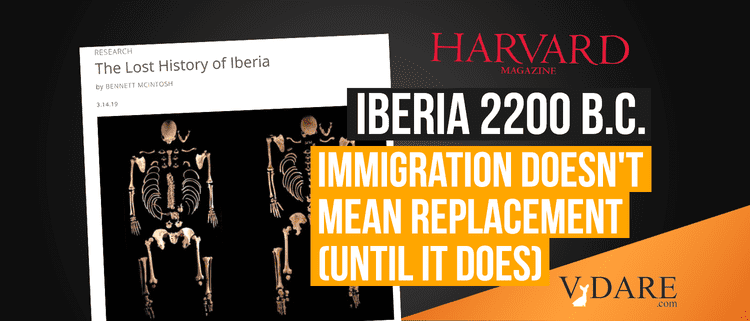


By Steve Sailer
02/28/2020
See, earlier: "Actually, There Has Always Been Migration" — But In Those Days They Called It Invading!
From the Harvard alumni magazine a year ago:
The Lost History of Iberia
by BENNETT MCINTOSH3.14.19
… The research is the latest study of ancient DNA from the lab of David Reich, a professor of genetics in HMS’s Blavatnik Institute, who has positioned himself as a juggernaut in the growing field of paleogenomics, the study of these ancient genomes. …
One new story is the case of the vanishing Iberian men. About 4,500 years ago, a new population group showed up in Iberia. Unlike the preexisting occupants, whose ancestors seem to be a mix of Iberian hunter-gatherers and farmers who had arrived thousands of years earlier from present-day Turkey, the new group had genes most similar to peoples who had earlier migrated into central Europe from the steppes north and east of the Black Sea. (Previous research has indicated that this group’s movement may have brought Indo-European languages to much of Europe.) This steppe ancestry group and the preexisting Iberian populations seem to have co-existed throughout the region for centuries, with minimal interbreeding. But when the populations did start mixing, they did so in a “sex-biased” way, as revealed by the Y chromosomes, present only in men: the steppe group’s Y chromosome type became increasingly common, while the preexisting occupants’ Y chromosome types essentially vanished over the course of barely 200 years. For some reason the steppe males were fathering far more children than males from the preexisting groups. (For more on a similar event, see “Who Killed the Men of England.”)
A previously unreported migration that replaced the entire male population of a region the size of Texas is the sort of grand addition to the past that has drawn both acclaim and fierce criticism to Reich and paleogenomics. …
But the Harvard researchers are quick to point out that the stories from the Iberia study are more complex than they may look at first. Whatever happened to the Iberian men, for instance, began only after the two groups had lived together throughout the region for centuries. “Iberia at this time,” Reich said in a phone interview, “is a multi-ethnic society” until somehow “that population substructure where these groups aren’t mixing breaks down everywhere we sampled.”
Something changed dramatically about 4,200 years ago. What that was is unknown, but the researchers caution against assuming the worst of the interloping males. “It would be a mistake to jump to the conclusion that Iberian men were killed or forcibly displaced,” said Iñigo Olalde, a postdoctoral fellow in Reich’s HMS lab and first author of the paper, “as the archaeological record gives no clear evidence of a burst of violence in this period.”
Genetics, in other words, can tell us when the Iberian males vanished, but not why that didn’t happen 300 years earlier, or whether it was due to war, slavery and subjugation, the cultural preferences of Iberian females, or some combination.
… The further revelation that the Basques in northeastern Iberia share significant ancestry with the steppe people of the same Bronze Age migration raises similar questions. Genetics can indicate that the steppe people mixed with the Basque people’s ancestors. But it cannot tell why the steppe people’s Indo-European language, which spread alongside their genes nearly everywhere in Europe, did not spread to the Basque regions.